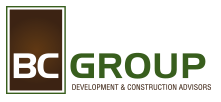What Are the Kinds of Due Diligence that a Commercial Construction Management Firm Perform for a Commercial Real Estate Developer?
Due diligence in commercial construction management involves a comprehensive evaluation of all aspects related to a construction project to ensure it is viable, legal, and financially sound. For a commercial real estate developer, a construction management firm like BC Group can perform various types of due diligence to mitigate risks and ensure the project’s success. Here are the key kinds of due diligence they typically perform:
1. Site and Environmental Due Diligence
- Site Analysis: Evaluating the physical characteristics of the site, including topography, accessibility, and utility availability.
- Environmental Assessment: Identifying any environmental hazards or concerns that might affect construction or future use of the site, such as soil contamination or endangered species habitats. This includes Phase I and Phase II Environmental Site Assessments (ESAs).
2. Legal and Regulatory Due Diligence
- Zoning and Land Use: Verifying that the site is zoned for the intended use and identifying any land use restrictions or covenants.
- Permitting: Ensuring all necessary construction permits can be obtained. This involves understanding local, state, and federal regulations.
- Title and Ownership: Examining the property title to identify any liens, easements, or other encumbrances that could impact the project.
3. Financial Due Diligence
- Project Costing: Estimating the total cost of the project, including materials, labor, equipment, and any unforeseen expenses.
- Budget Analysis: Reviewing the project budget to ensure it is realistic and provides for contingencies.
- Funding and Financing: Assessing the availability of funding sources and the terms of financing to ensure the project’s financial feasibility.
4. Technical and Construction Due Diligence
- Design Review: Evaluating the project’s architectural and engineering designs for feasibility, code compliance, and functionality.
- Construction Methodology: Assessing the proposed construction methods and timelines for efficiency and practicality.
- Contractor and Supplier Evaluation: Vetting potential contractors, subcontractors, and suppliers for reliability, experience, and financial stability.
5. Market and Feasibility Due Diligence
- Market Analysis: Studying the local real estate market to assess demand for the type of development being considered.
- Economic Feasibility: Evaluating the economic implications of the project, including projected returns on investment and the potential for revenue generation.
6. Risk Management Due Diligence
- Risk Assessment: Identifying potential risks to the project, from construction delays and cost overruns to market fluctuations and environmental issues.
- Mitigation Strategies: Developing strategies to mitigate identified risks, including insurance, alternative planning, and contingency budgets.
7. Operational Due Diligence
- Operational Planning: Assessing the operational aspects of the project, including maintenance, management, and staffing needs post-construction.
- Sustainability and Efficiency: Evaluating the project’s sustainability practices and energy efficiency measures for long-term operational savings and environmental compliance.
Performing comprehensive due diligence is critical for commercial real estate developers to make informed decisions, minimize risks, and ensure the success of their construction projects. A construction management firm, through its detailed due diligence processes, provides the developer with the confidence that all aspects of the project have been thoroughly evaluated and are in line with the project’s goals and objectives.
